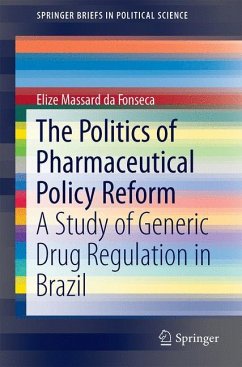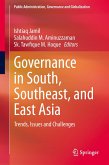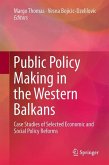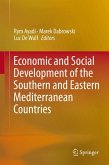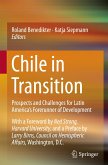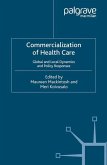Brazil is renowned worldwide for its remarkable reforms in pharmaceutical regulation, which have enhanced access to essential medicines while lowering drug costs. This book innovates by analysing the generic drug reform in Brazil, demonstrating that pharmaceutical regulation is only partially influenced by non-state actors. Little is known about the institutional antecedents and policy process that channeled this regulatory reform. This is particularly intriguing because a regulatory shift in the pharmaceutical sector requires the participation of a number of stakeholders and interest groups in the policy process. Fonseca examines the generic drug reform's causes and consequences. No study has approached the generic drug regulation in Brazil from this perspective.
The Politics of Pharmaceutical Policy Reform: A Study of Generic Drug Regulation in Brazil, explores the following:
· The politics of pharmaceutical regulation in Brazil over the last 25 years.
· The political negotiations to approve the Generic Drug Act, which involved a hard-to-reach agreement between the pharmaceutical industry (national and multinational), the Ministry of Health, and Congress
· The controversial decisions to regulate packaging and pharmaceutical equivalence.
· The surprising success of Brazilian pharmaceutical firms, which became market champions in a sector largely dominated by multinational firms.
· Comparative lessons from the Brazilian case for the political construction of regulatory standards to regulate generic drugs and its effects on global health.
This book will interest political scientists and health policy scholars concerned with the political conflicts in the pharmaceutical sector. It argues against well-established approaches to regulatory capture such as control of the regulatory process by interest groups and policy diffusion. It can be used as evidence for graduate courses in public policy, health policy and political science. Because Brazil is one of the largest markets for pharmaceuticals in the world, business leaders and consultancy firms would also be interested.
The Politics of Pharmaceutical Policy Reform: A Study of Generic Drug Regulation in Brazil, explores the following:
· The politics of pharmaceutical regulation in Brazil over the last 25 years.
· The political negotiations to approve the Generic Drug Act, which involved a hard-to-reach agreement between the pharmaceutical industry (national and multinational), the Ministry of Health, and Congress
· The controversial decisions to regulate packaging and pharmaceutical equivalence.
· The surprising success of Brazilian pharmaceutical firms, which became market champions in a sector largely dominated by multinational firms.
· Comparative lessons from the Brazilian case for the political construction of regulatory standards to regulate generic drugs and its effects on global health.
This book will interest political scientists and health policy scholars concerned with the political conflicts in the pharmaceutical sector. It argues against well-established approaches to regulatory capture such as control of the regulatory process by interest groups and policy diffusion. It can be used as evidence for graduate courses in public policy, health policy and political science. Because Brazil is one of the largest markets for pharmaceuticals in the world, business leaders and consultancy firms would also be interested.
"Brazil, in public health as in so many other things, is much discussed but frequently misunderstood. For all the ink spilt discussing access to medicines, astonishingly little work has investigated the actual politics and effects of Brazil's famously innovative access to medicines policy. Fonseca's pathbreaking book solves this problem, bringing Brazilian politics into the analysis. She brings the rigor and comparative perspective of political economy together with deep research to map out the political economy of a policy shift that changed global debates. This book should be required reading in global and comparative health policy, for very few are so rigorous in their understanding of the politics of pharmaceuticals, global health, or Brazil".
-- Scott L. Greer, University of Michigan and European Observatory on Health Systems and Policies.
"This book is based on extensive research on the politics of pharmaceutical regulations in Brazil, a subject that has received insufficient attention but will be of increasing importance. Reconciling the objectives of stimulating competition to achieve lower prices of drugs, and raising quality standards, is a major challenge faced by regulators in developing countries throughout the world. Brazil has been a leader in this regard. Fonseca's astute analysis of the Brazilian case provides key insights for understanding these processes".
-- Ken Shadlen, London School of Economics and Political Science
-- Scott L. Greer, University of Michigan and European Observatory on Health Systems and Policies.
"This book is based on extensive research on the politics of pharmaceutical regulations in Brazil, a subject that has received insufficient attention but will be of increasing importance. Reconciling the objectives of stimulating competition to achieve lower prices of drugs, and raising quality standards, is a major challenge faced by regulators in developing countries throughout the world. Brazil has been a leader in this regard. Fonseca's astute analysis of the Brazilian case provides key insights for understanding these processes".
-- Ken Shadlen, London School of Economics and Political Science

